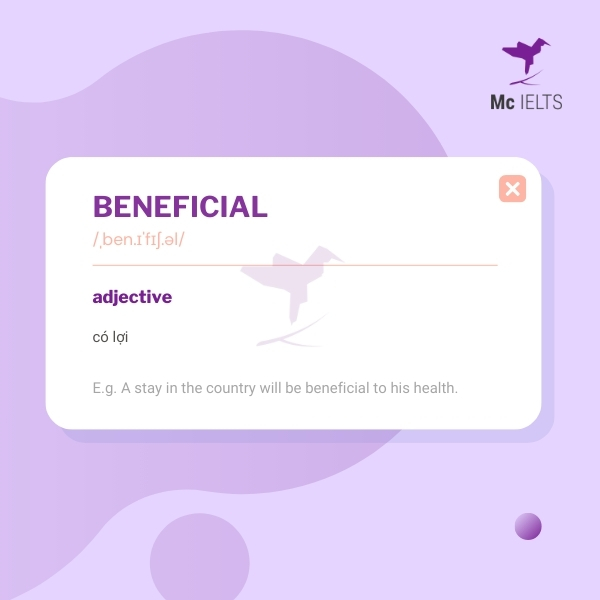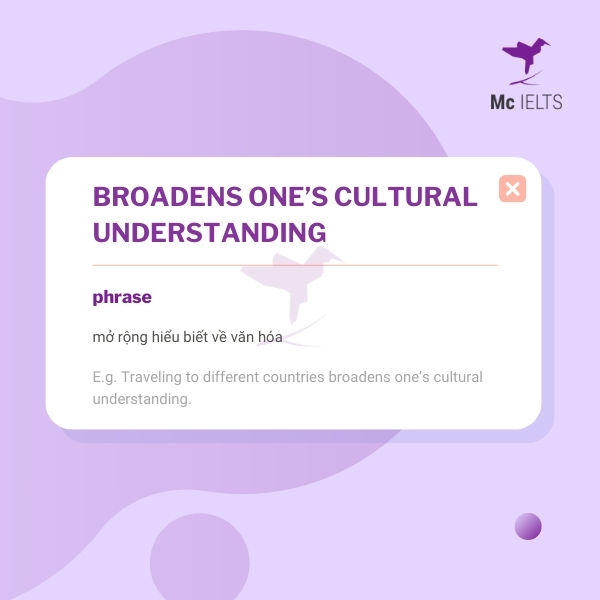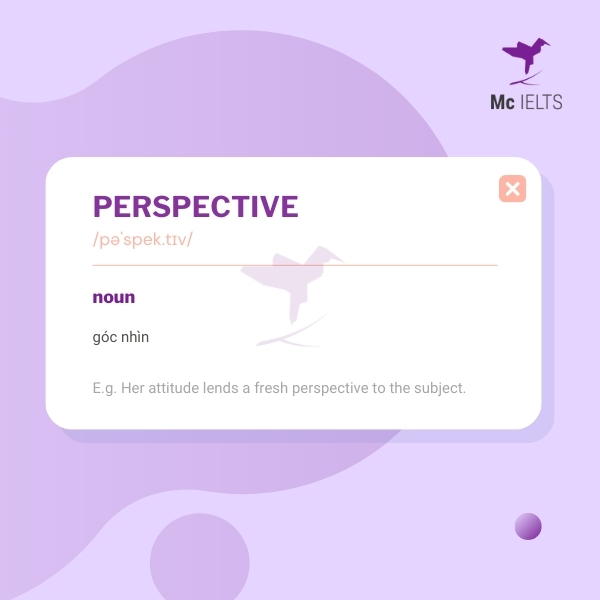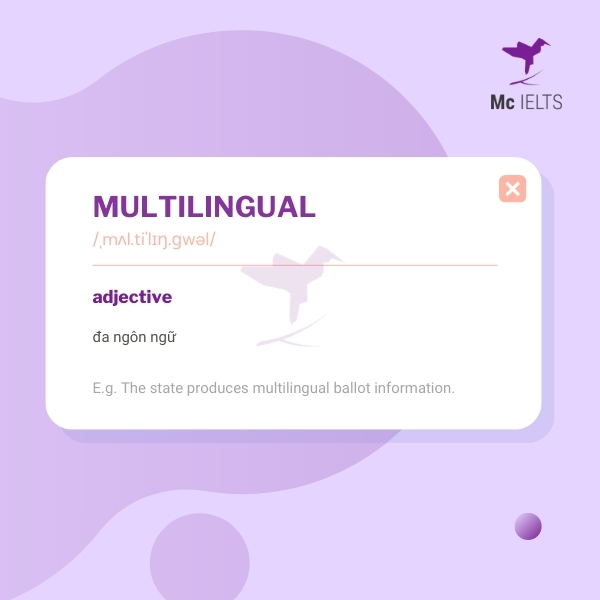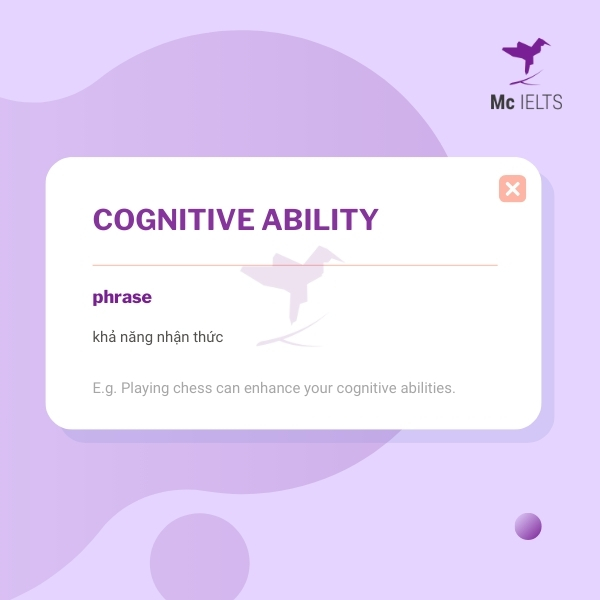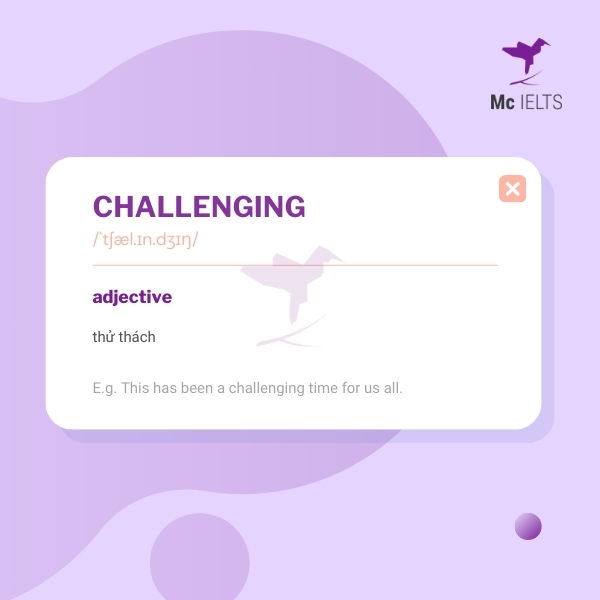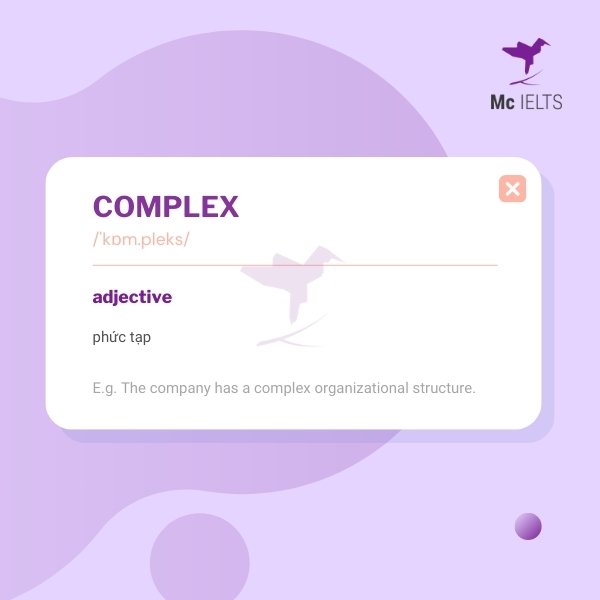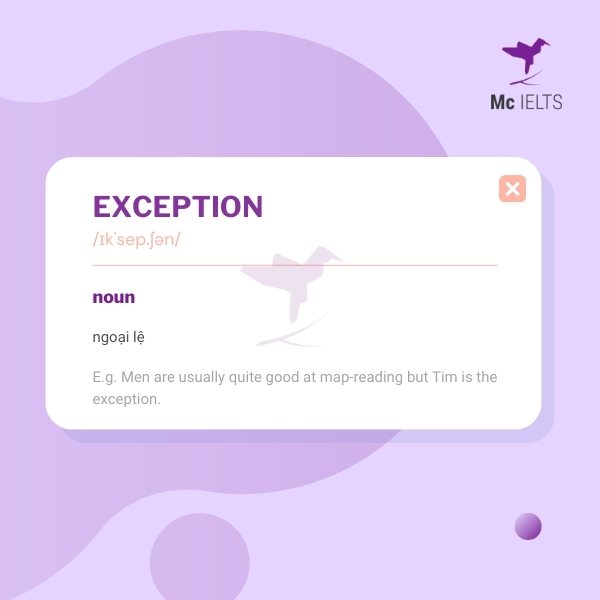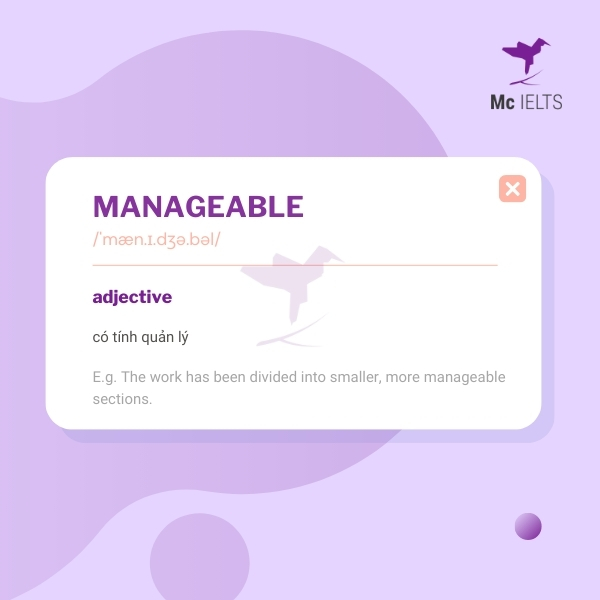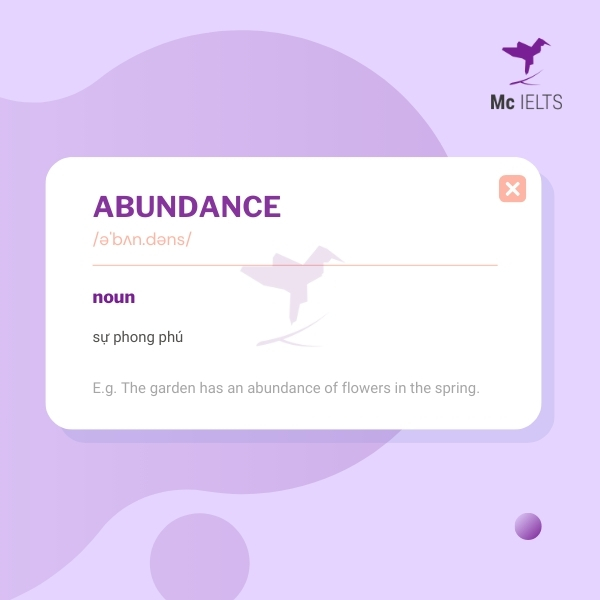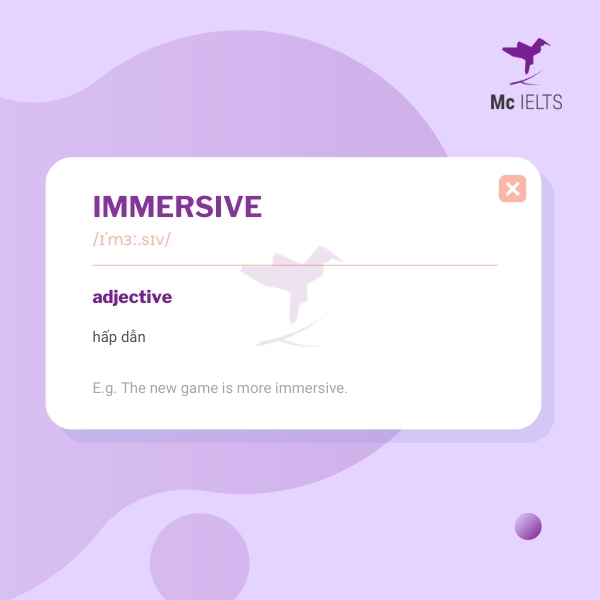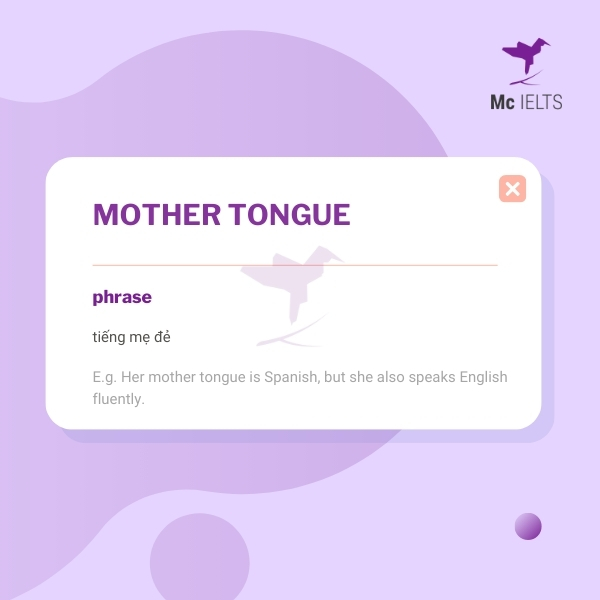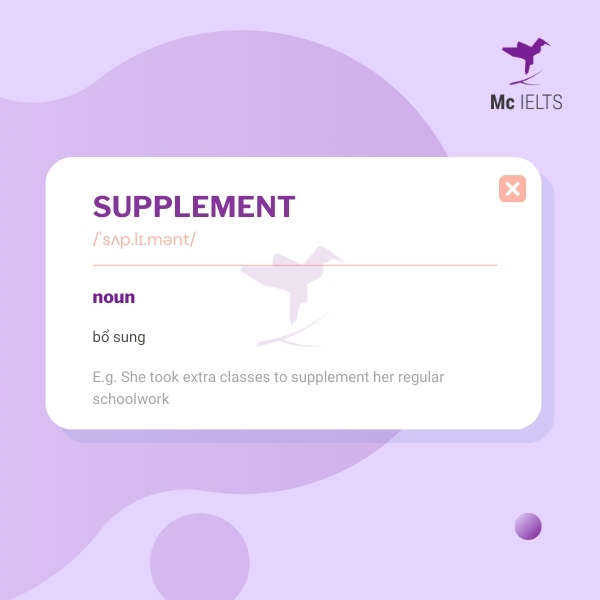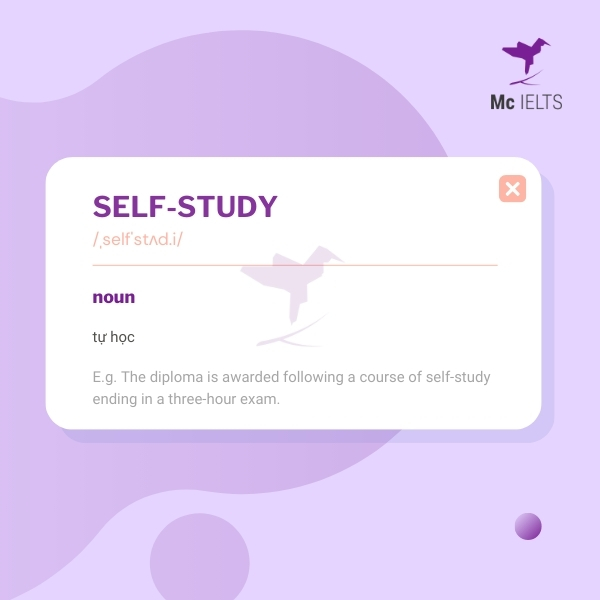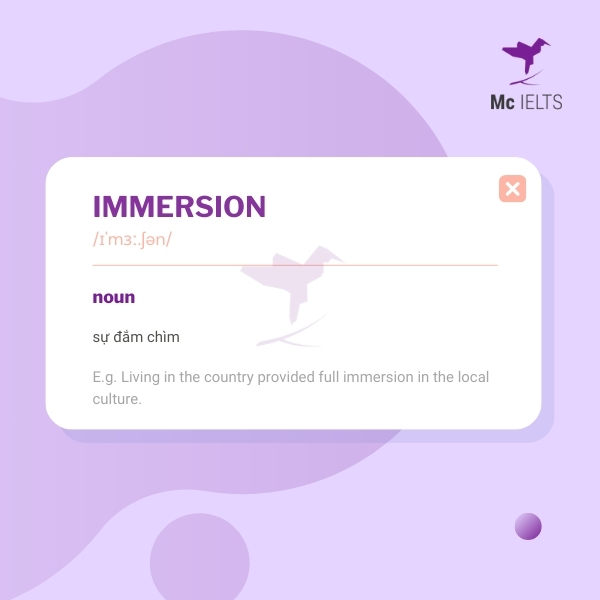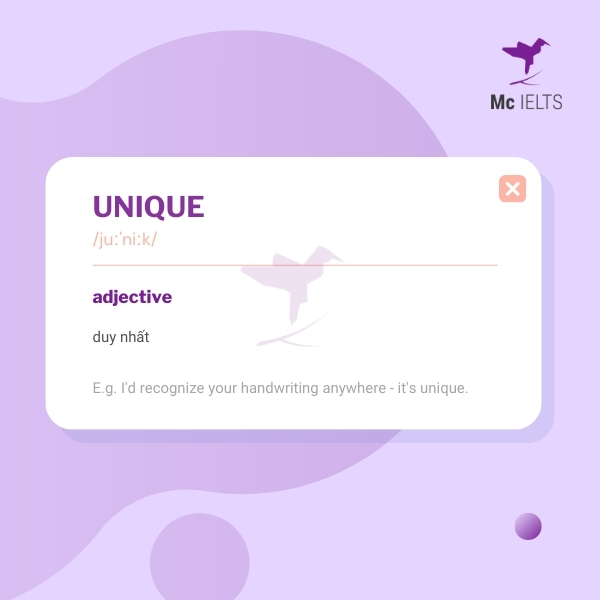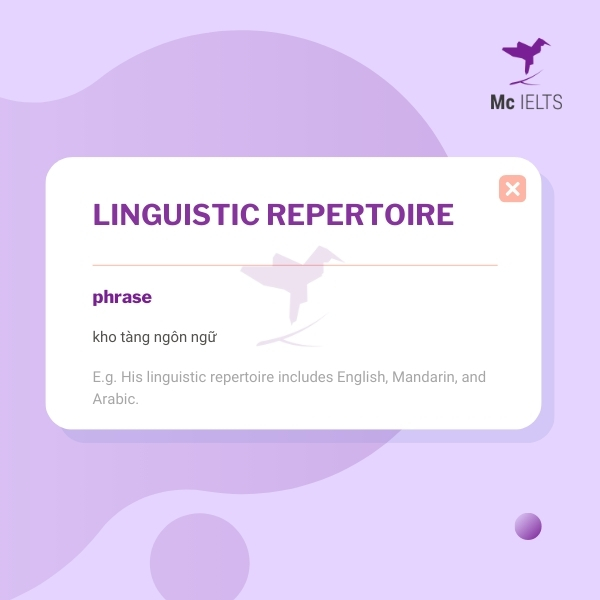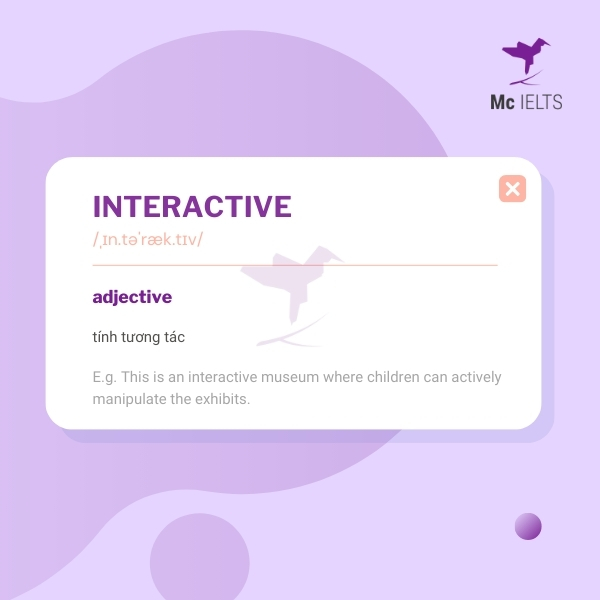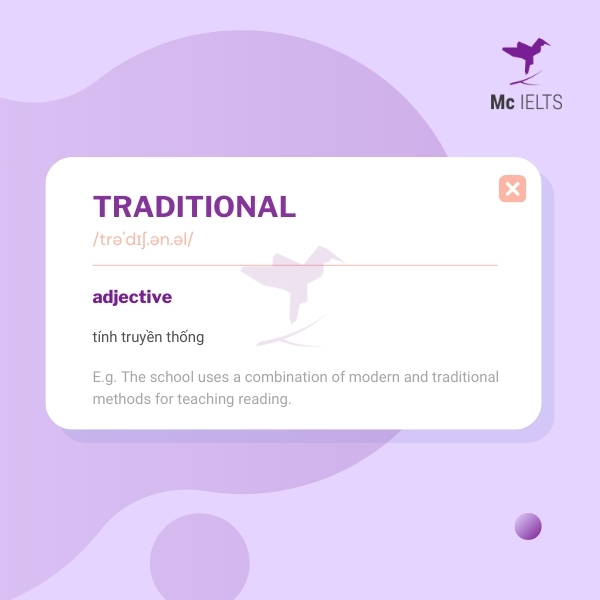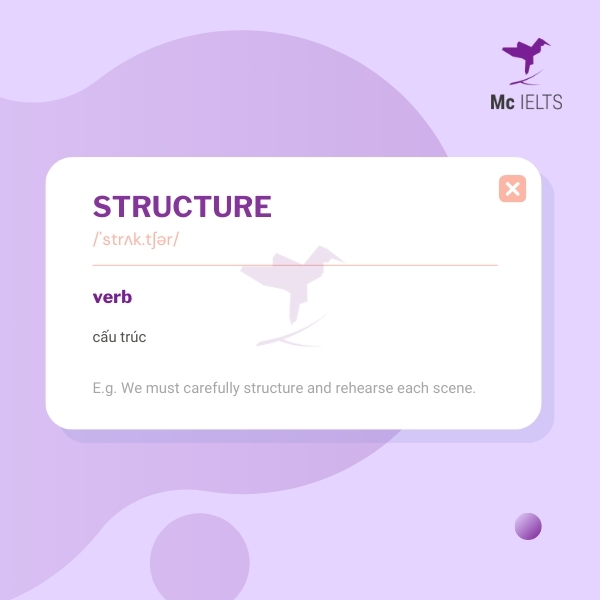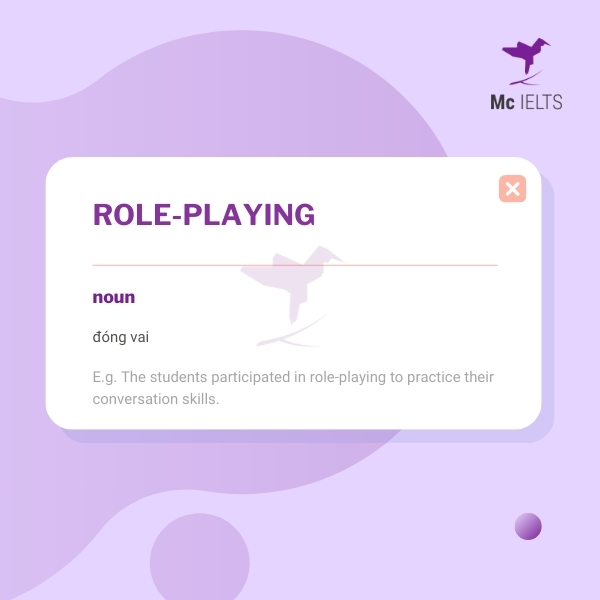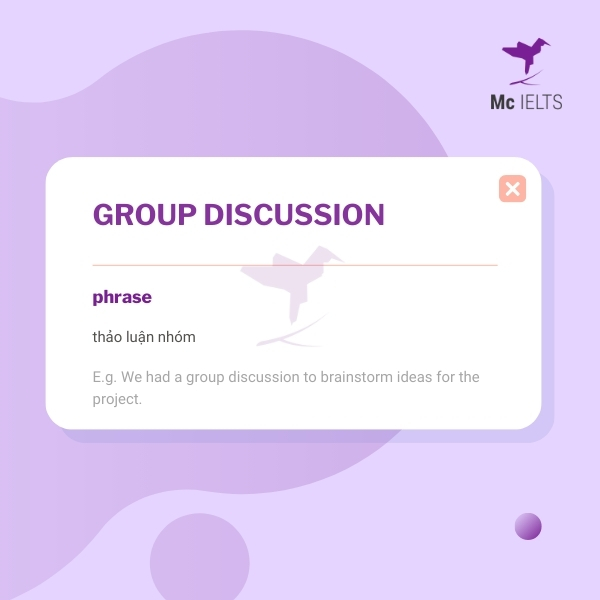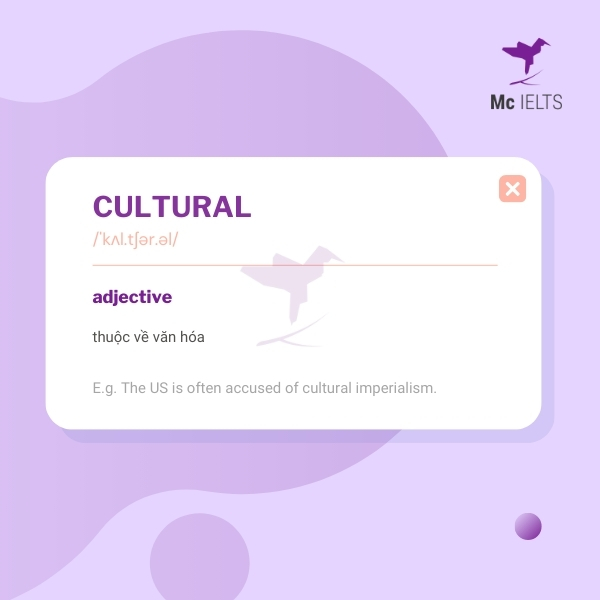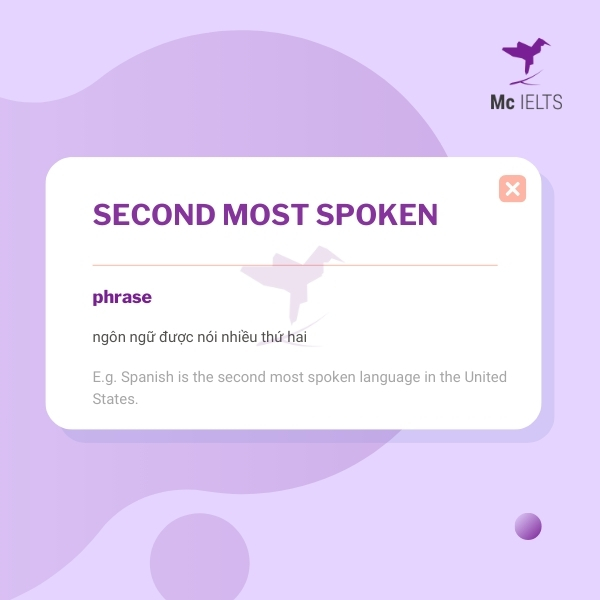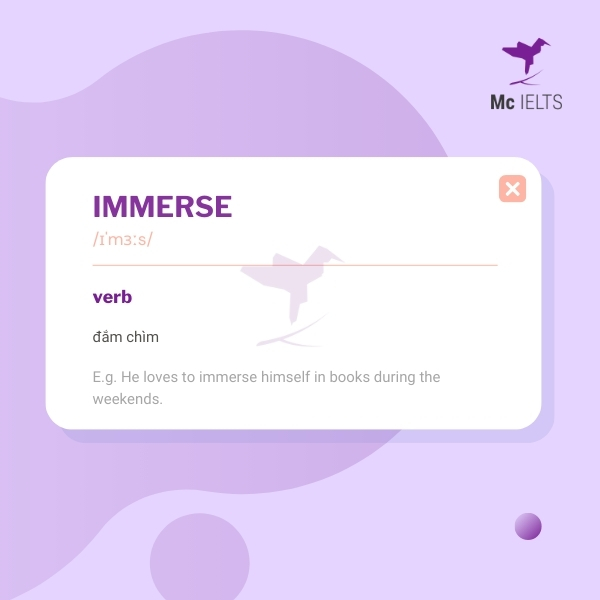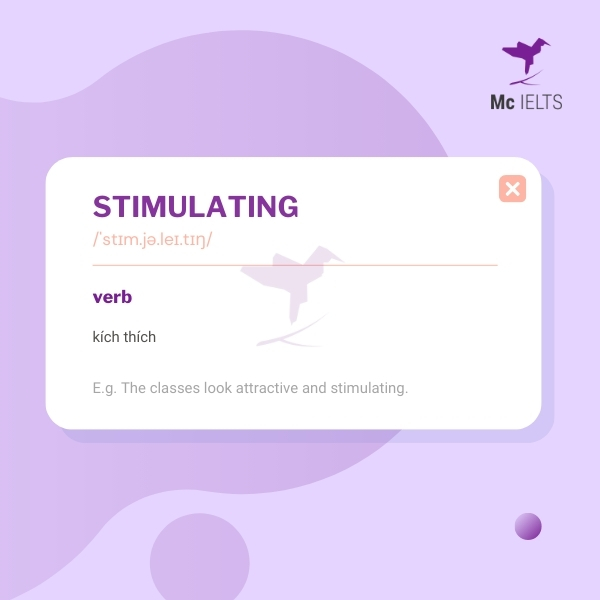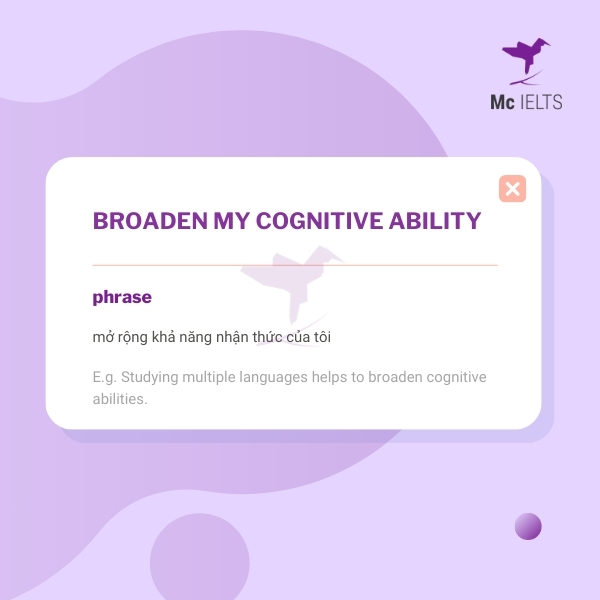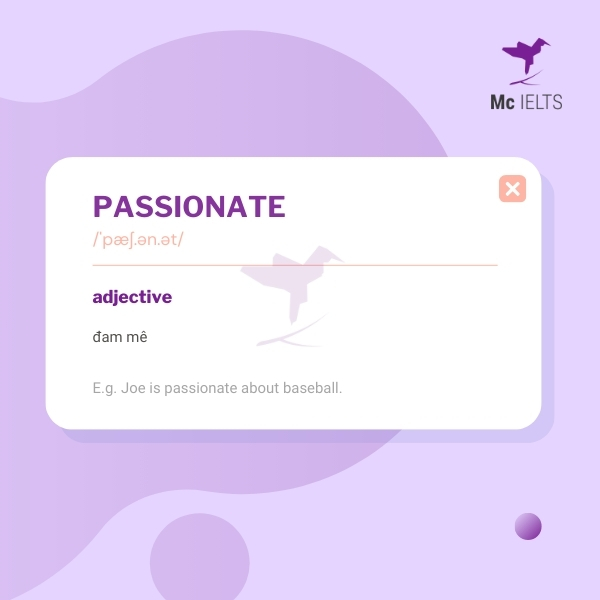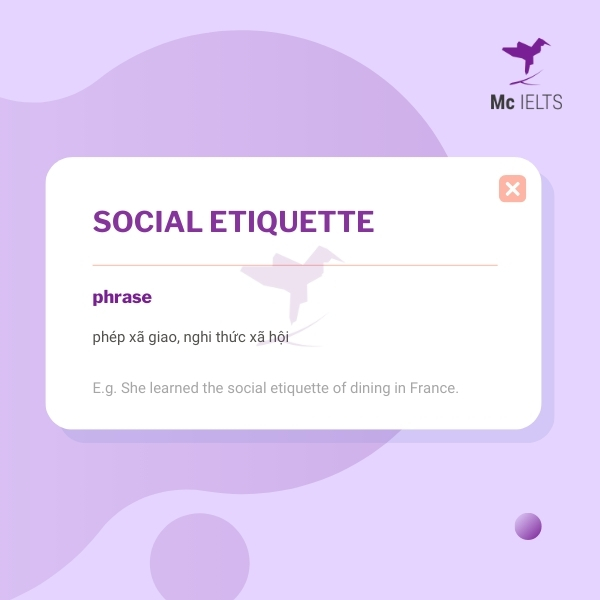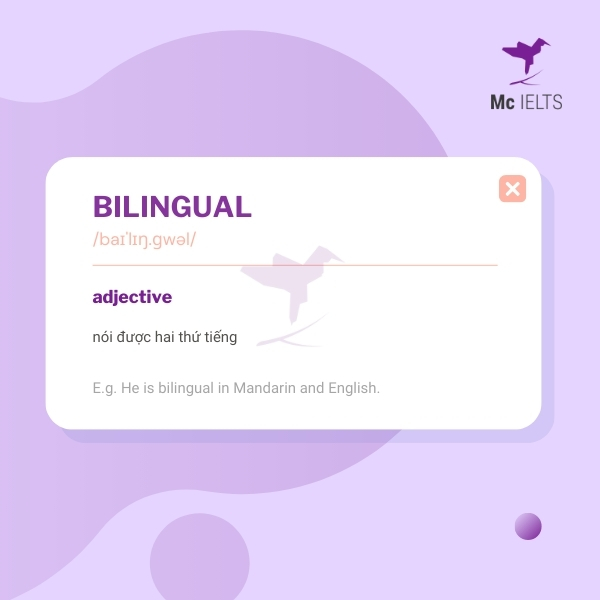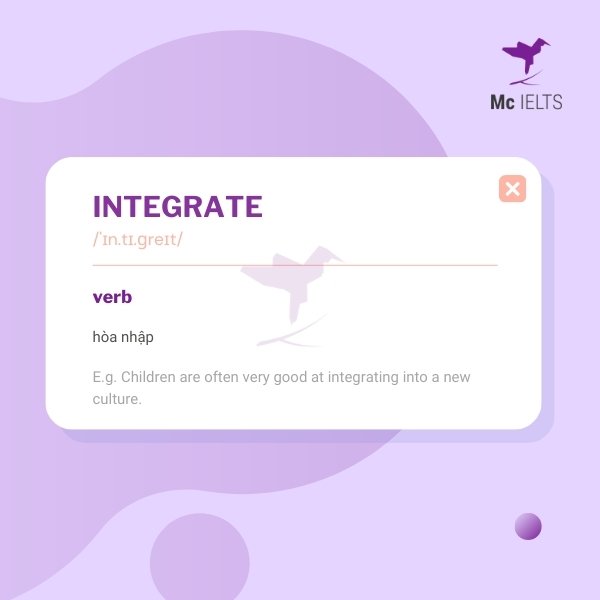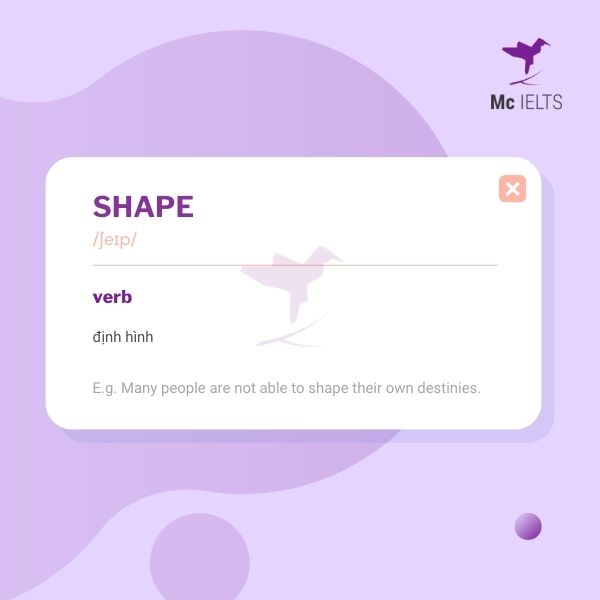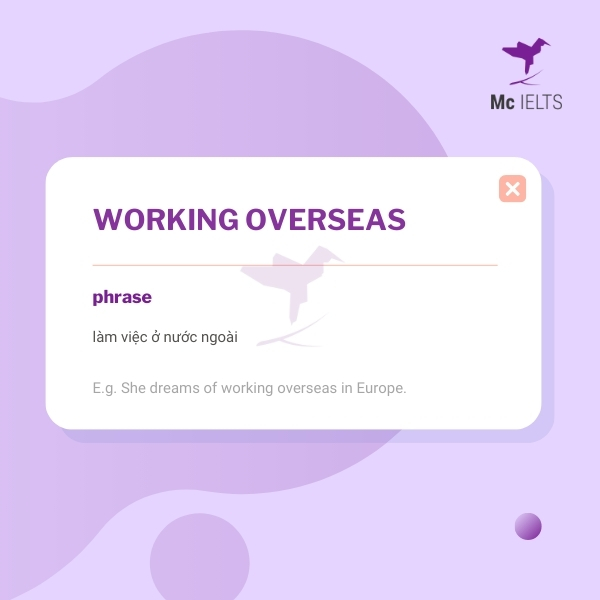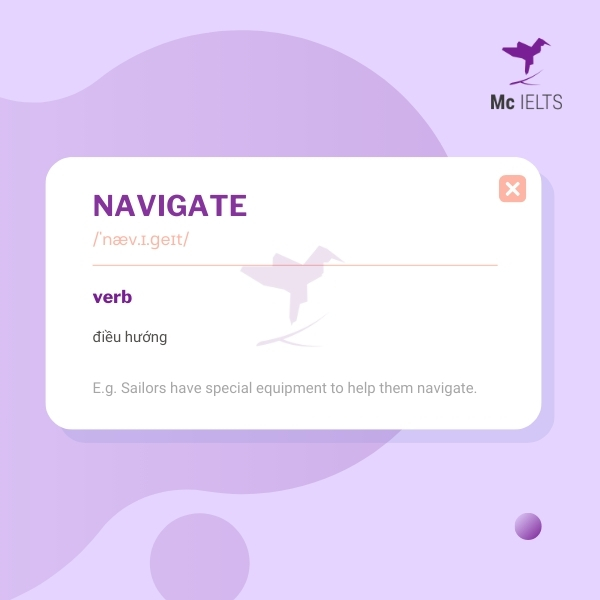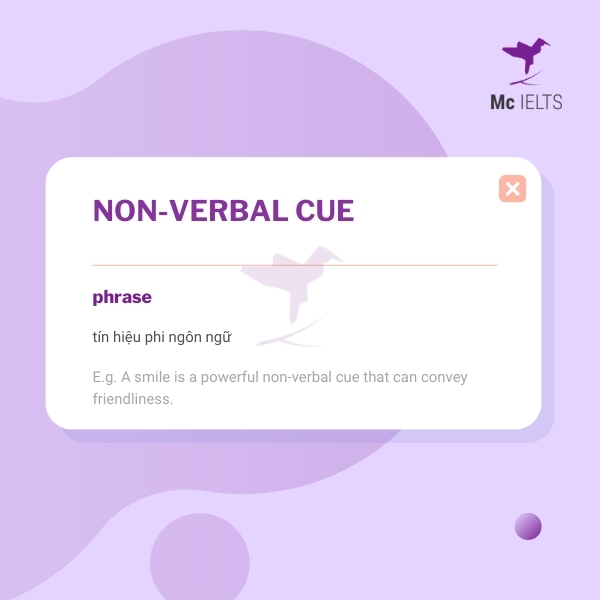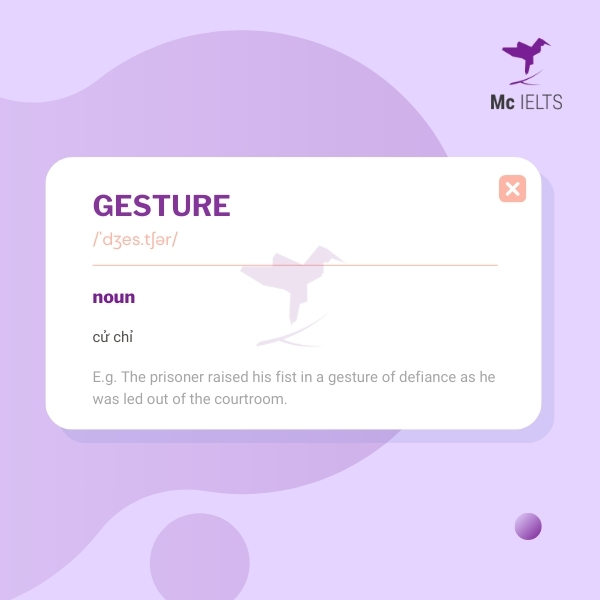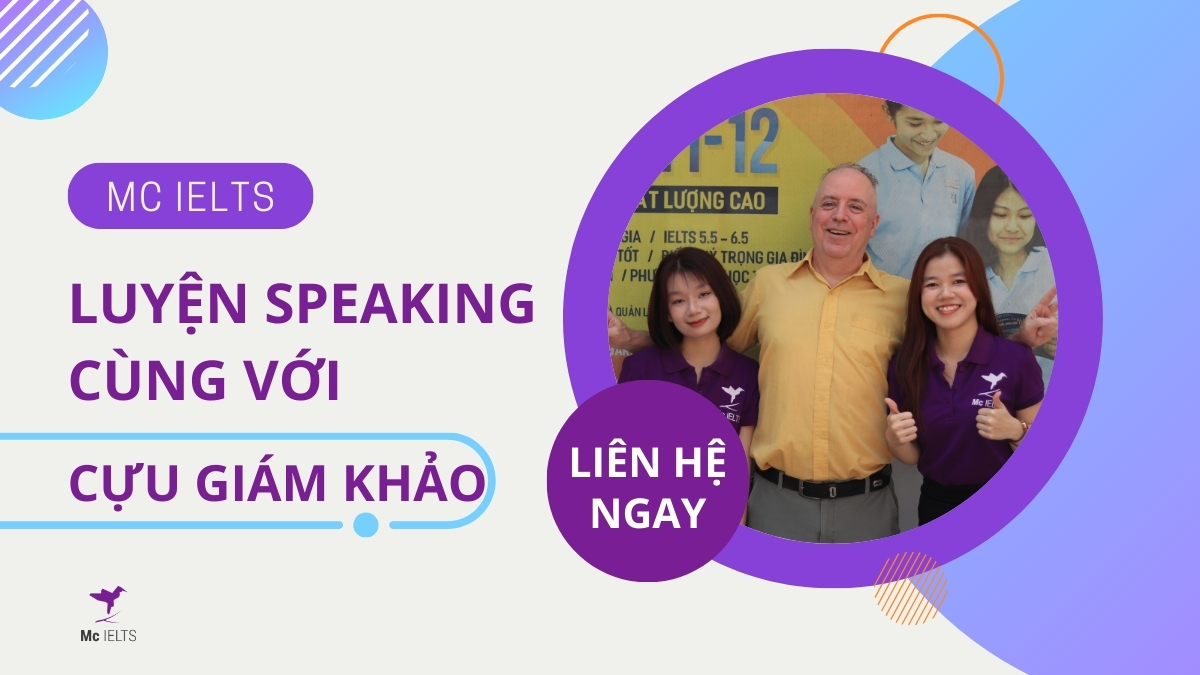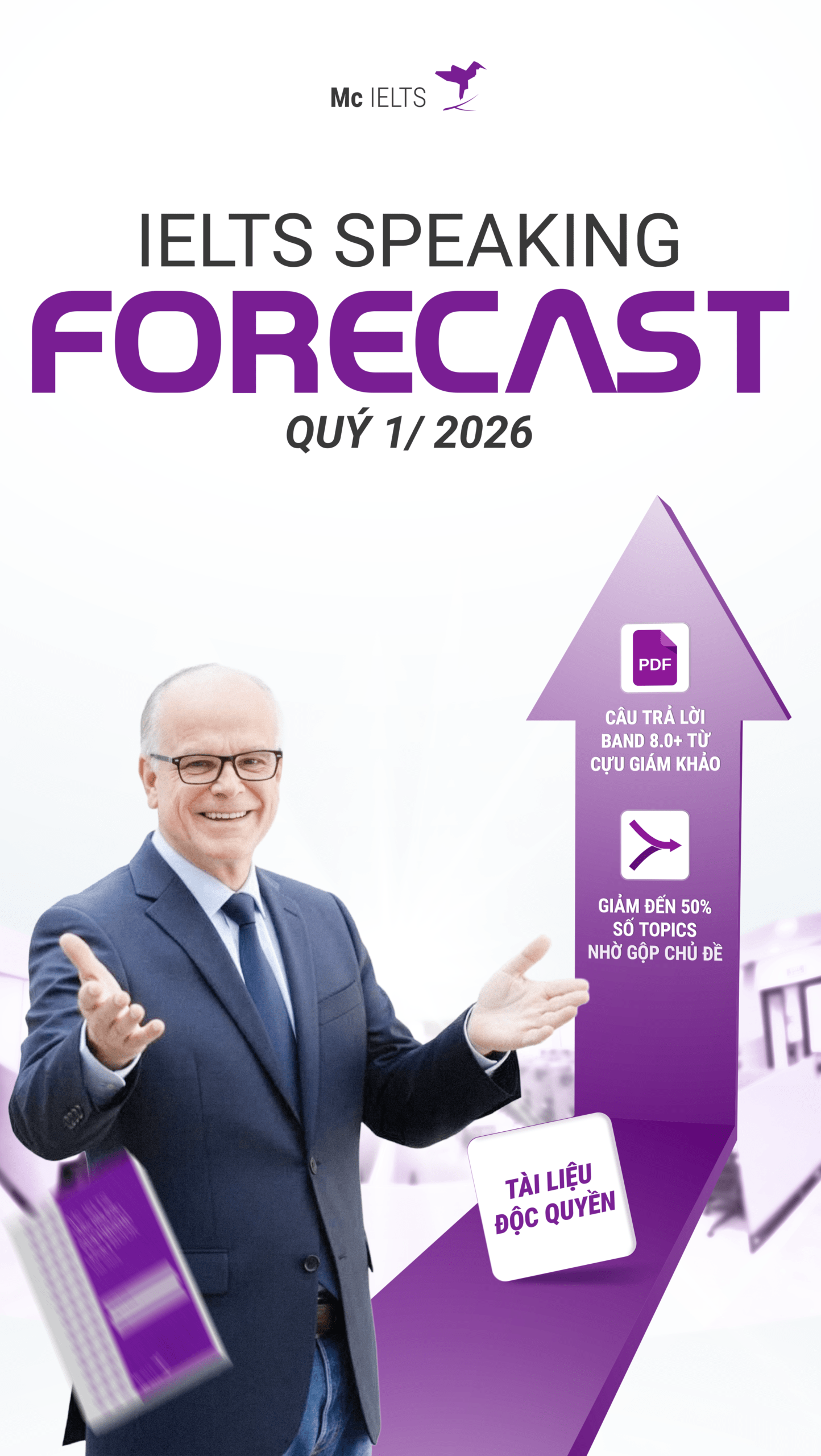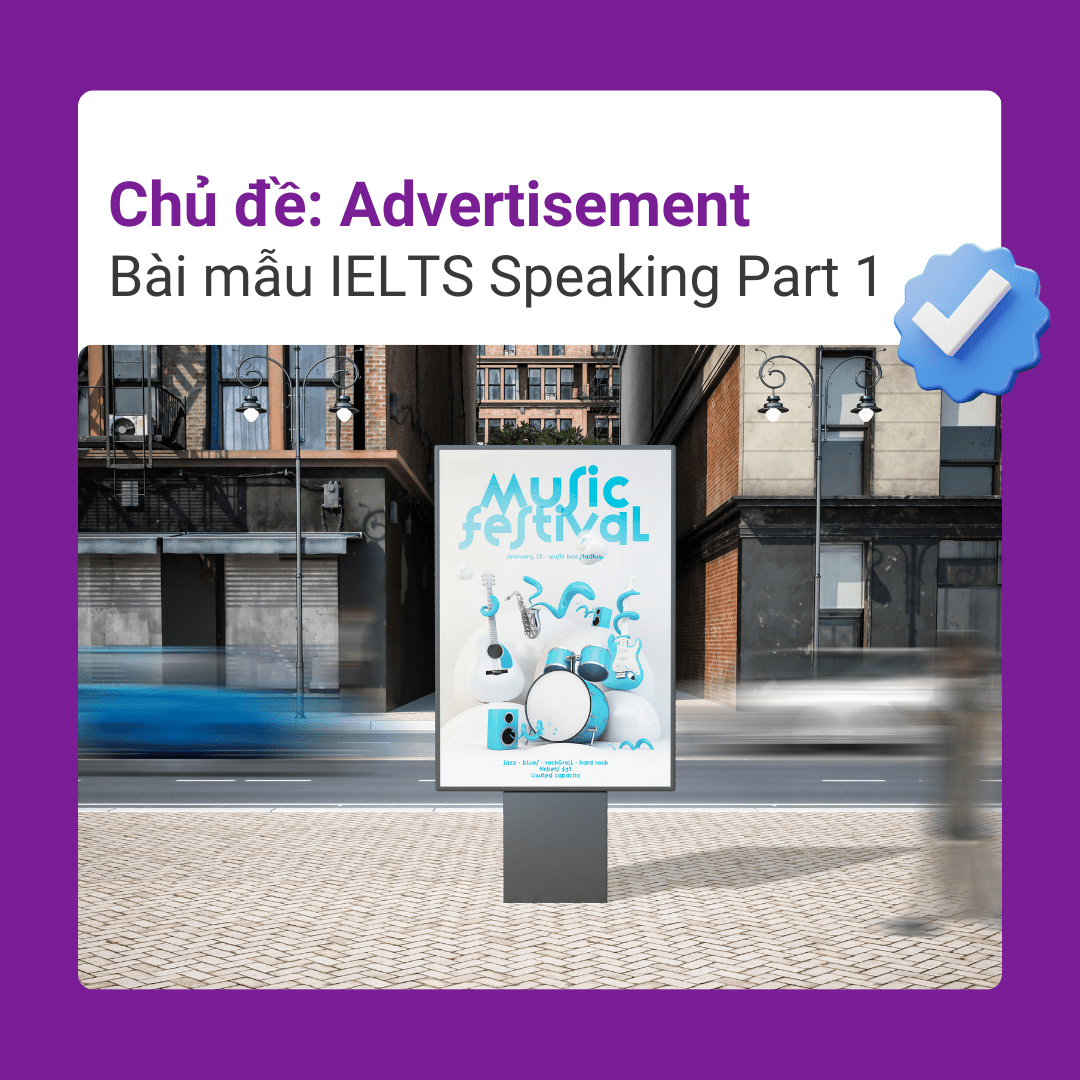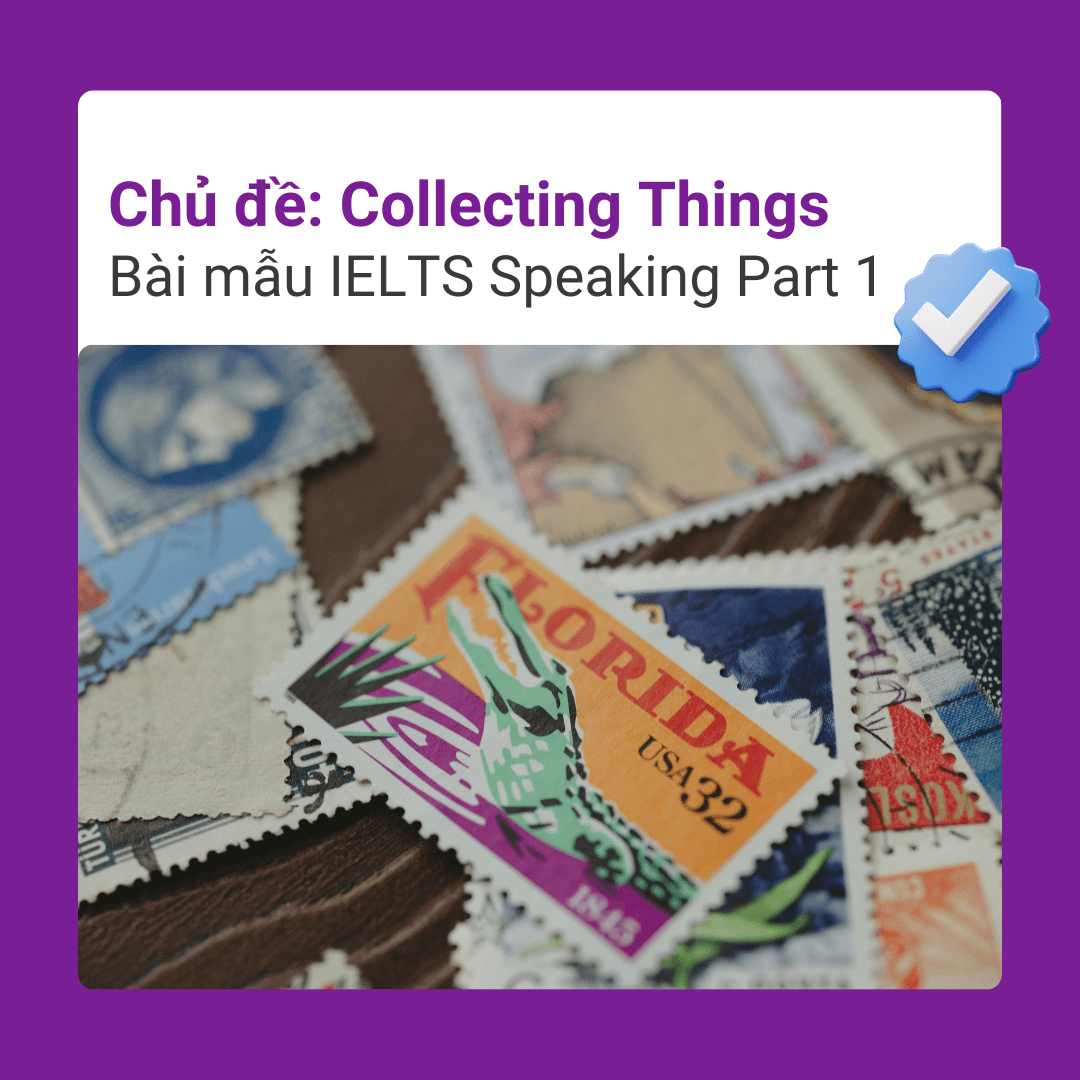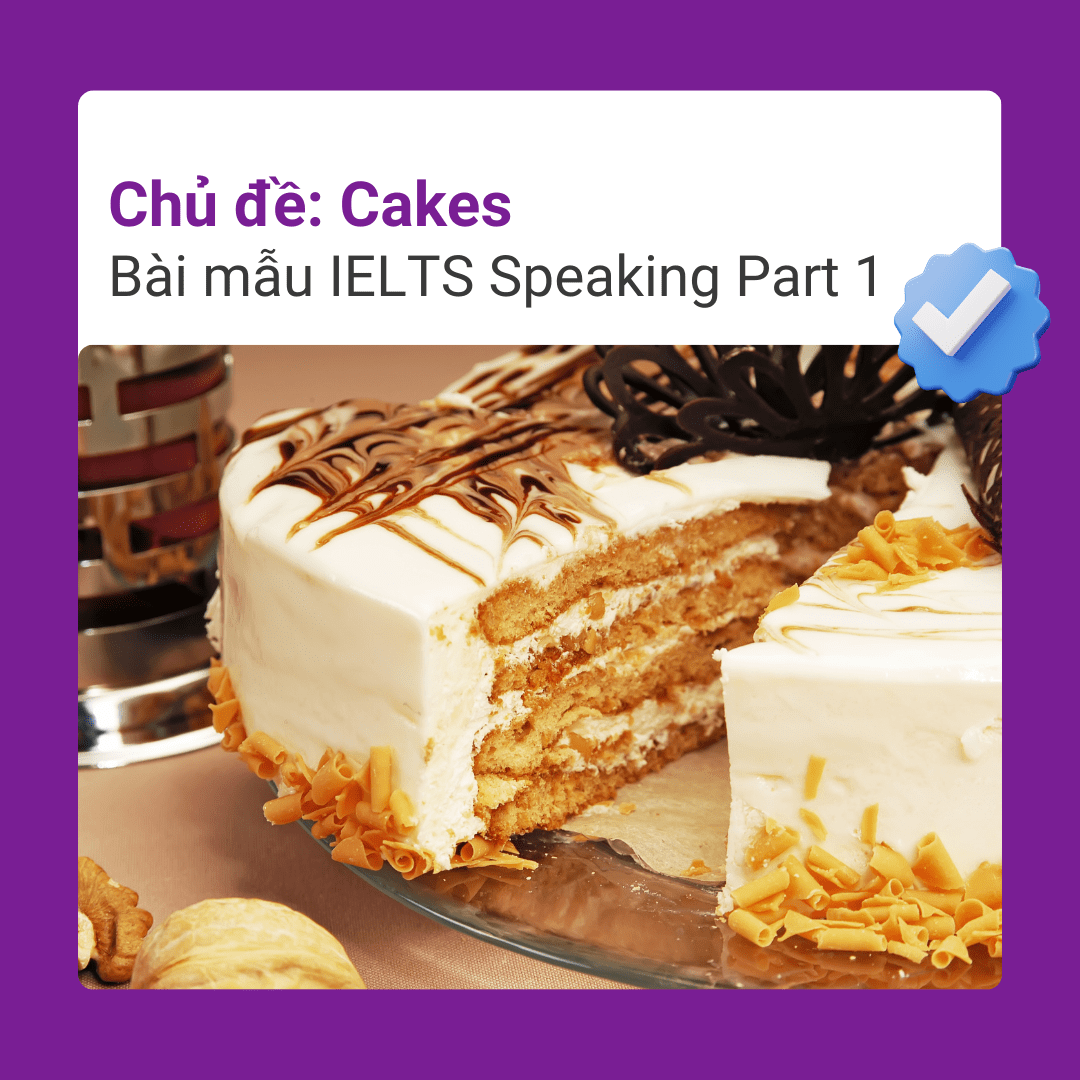IELTS Speaking Part 1,2,3: Topic What language do you speak
 11/07/2024
11/07/2024
 Tác giả : Mc IELTS
Tác giả : Mc IELTS
Bạn có bao giờ tự hỏi ngôn ngữ mà bạn nói có thể kể lên câu chuyện gì về bản thân mình? Chủ đề What language do you speak trong bài thi IELTS Speaking sẽ là cơ hội để bạn để bạn nói về những câu chuyện thú vị về hành trình học ngôn ngữ của bạn. Trong bài viết này, Mc IELTS sẽ cùng bạn khám phá cách biến chủ đề này thành một phần thi IELTS Speaking đầy ấn tượng. Qua đó, bạn sẽ học được cách kể chuyện cuốn hút, sử dụng từ vựng phong phú và tạo ấn tượng mạnh mẽ với giám khảo.
| Key takeaway |
Câu hỏi Topic What languages can you speak Part 1:
Câu hỏi Topic What language do you speak Part 2:
Câu hỏi Topic IELTS Topic Language Part 3:
Những từ vựng và một số cách diễn đạt thường dùng liên quan đến chủ đề IELTS Speaking Language. |
Bài mẫu chủ đề What language do you speak – IELTS Speaking Part 1
Đối với chủ đề What languages can you speak trong IELTS Speaking Part 1, bạn sẽ được hỏi về ngôn ngữ mẹ đẻ, các ngôn ngữ khác mà bạn có thể nói, cũng như những kinh nghiệm học ngôn ngữ của bạn. Nội dung dưới đây sẽ cung cấp câu trả lời mẫu, nhằm giúp bạn diễn đạt ý tưởng một cách mạch lạc và tự tin, từ đó ghi điểm cao hơn trong kỳ thi IELTS. Hãy cùng tham khảo các bài mẫu topic Language IELTS Speaking Part 1 cụ thể để học IELTS hiệu quả và chuẩn bị thật tốt cho phần thi này!

Bài mẫu topic language IELTS speaking part 1
What languages do you speak?
I speak Vietnamese, which is my native language, and I am also fluent in English. Additionally, I have a basic understanding of French, which I studied during my high school years. As you can see, being able to communicate in multiple languages has been incredibly beneficial, both personally and professionally.
Từ vựng:
Do you think learning languages is important?
Absolutely, I believe learning languages is crucial. It not only enhances communication skills but also broadens one’s cultural understanding and perspective. In today’s globalized world, being multilingual can provide significant advantages in both social and professional contexts. Moreover, language learning helps improve cognitive abilities and opens up numerous opportunities for travel and connection.
Từ vựng:
Do you think that English is difficult to learn?
Yes, English can be quite challenging to learn, especially due to its complex grammar rules and numerous exceptions. The pronunciation can also be tricky, as many words are not pronounced the way they are spelled. However, with consistent practice and the right resources, it becomes much more manageable. Moreover, the abundance of English-language media, such as movies, books, and websites, can make the learning process more engaging and immersive.
Từ vựng:
How did you learn the languages that you know?
Obviously, I learned Vietnamese from my family and environment as it is my mother tongue. For English, I started learning it in school at a young age and continued through high school and university. I also took additional courses to supplement my learning. I practiced by watching English movies and reading books, and of course, did plenty of self-study. Consistent practice and immersion have been key to mastering these languages.
Từ vựng:
What languages would you like to learn in the future?
In the future, I would love to learn Japanese and Spanish. Japanese intrigues me due to its unique culture and writing system, and I have a keen interest in visiting Japan. Spanish, on the other hand, is widely spoken globally and would be incredibly useful for travel and communication in many countries. Both languages would add significant value to my linguistic repertoire and enhance my cultural appreciation.
Từ vựng:
How are languages taught and learned in your school?
In my school, languages are taught through a combination of interactive and traditional methods. We have structured lessons that cover grammar, vocabulary, and pronunciation, along with interactive activities like role-playing and group discussions. Besides, we are encouraged to practice speaking in the language outside the classroom and participate in cultural events related to the language being learned.
Từ vựng:
Bài mẫu chủ đề What language do you speak – IELTS Speaking Part 2
Trong phần 2 của IELTS Speaking, khi được yêu cầu nói về ngôn ngữ mà bạn học, bạn sẽ có cơ hội trình bày chi tiết về quá trình học ngôn ngữ, những thử thách và thành tựu của mình. Đây là thời điểm để bạn thể hiện khả năng kể chuyện, sử dụng từ vựng phong phú và cấu trúc câu phức tạp. Nội dung dưới đây sẽ cung cấp cho bạn những bài mẫu chỉn chu nhằm giúp bạn ôn thi IELTS hiệu quả và tự tin khi bước vào phần thi.

Bài mẫu chủ đề What languages can you speak IELTS Speaking Part 2
Describe a language other than English that you would like to learn
One language that I would be incredibly enthusiastic to learn is Spanish. Not only is Spanish the second most spoken language in the world, but it also has a rich cultural heritage that I find fascinating. There are several reasons why I am particularly drawn to Spanish.
Firstly, Spanish is widely used across the globe, especially in Spain and Latin America. This global reach makes it an extremely practical language for travel, business, and even social interactions. Learning Spanish would enable me to immerse myself more deeply in these experiences and communicate more effectively with native speakers.
Moreover, the process of learning Spanish would be intellectually stimulating. Given that I am already proficient in English and Vietnamese, which are from different language families, adding Spanish to my repertoire would provide a fresh linguistic challenge. It would require me to understand new grammar structures, vocabulary, and pronunciation patterns, which I believe would broaden my cognitive abilities.
In Vietnam, you might not know but Spanish is gaining popularity among young people. Many universities offer Spanish courses, and there are cultural exchange programs with Spanish-speaking countries. I envision myself participating in such programs, perhaps even studying abroad in a Spanish-speaking country to enhance my linguistic skills and cultural understanding.
Từ vựng:
Describe the reasons that make you learn foreign languages
There are several reasons why I’m passionate about learning foreign languages. First and foremost, it opens up a world of opportunities. In today’s globalized world, being multilingual is a huge advantage. It can enhance career prospects significantly, especially with multinational companies looking for employees who can communicate in multiple languages.
Another aspect is cultural insights. When you learn a new language, you get a deeper understanding of the customs, traditions, and perspectives of the people who speak it. For example, learning Japanese has given me a new appreciation for their social etiquette and the philosophy behind their art forms, like tea ceremonies and calligraphy. It’s fascinating!
Learning languages also boosts cognitive abilities. It helps with memory, problem-solving, and even multitasking. Studies show that bilingual people often have better mental flexibility and can handle complex situations more effectively. This intellectual challenge is something I really enjoy.
In Vietnam, where I’m from, knowing foreign languages is becoming increasingly important. Our economy is integrating more with the global market, so many students and professionals are learning English, Chinese, and Japanese to grab international opportunities. Personally, I find that being able to speak multiple languages helps me connect with people from different backgrounds, fostering a sense of global community and mutual respect.
So, the reasons for learning foreign languages are pretty varied – from career and personal growth to cognitive benefits. This journey not only equips me with new skills but also broadens my horizons and deepens my understanding of the world.
Từ vựng:
Bài mẫu chủ đề What language do you speak – IELTS Speaking Part 3
Part 3 sẽ mở ra những cuộc thảo luận sâu hơn về các khía cạnh của việc học và sử dụng ngôn ngữ. Khi được hỏi về What languages can you speak, bạn sẽ cần phân tích tầm quan trọng của việc biết nhiều ngôn ngữ, ảnh hưởng của ngôn ngữ đến văn hóa và xã hội, cũng như những lợi ích và thách thức của việc học ngôn ngữ mới. Nội dung dưới đây sẽ cung cấp những bài mẫu chi tiết và các gợi ý thực tế, giúp bạn luyện IELTS Speaking đạt hiệu quả và tự tin đối mặt với giám khảo.

Bài mẫu topic What languages can you speak Part 3
Do you want to become a foreign language teacher in the future? Why?
To be honest, becoming a foreign language teacher isn’t something I’m aiming for right now. While I do respect the profession immensely, my passion leans more towards technology and innovation. However, I do see how valuable language teachers are, especially here in Vietnam, where good English skills can really open doors for people. My own journey learning English has been shaped by some amazing teachers, so I truly appreciate what they do. In the end, even though it’s not my path, I have a lot of admiration for those who choose it.
Từ vựng:
Why is there a strong demand for language skills?
The demand for language skills is really high these days because of how connected the world has become. In Vietnam, as our economy grows and we engage more in international trade, companies are looking for employees who can communicate well with partners abroad. Knowing a foreign language, especially English, also means more opportunities for studying and working overseas. Plus, with so much happening online, being able to understand different languages helps navigate various cultural contexts better. So, having strong language skills is a big advantage in today’s job market.
Từ vựng:
What is the difference between talking over the phone and face-to-face conversation?
Talking over the phone and face-to-face conversations are quite different. Face-to-face interactions let you use non-verbal cues like body language and facial expressions, which can really help in communication. In Vietnam, where gestures and eye contact are important for showing respect and sincerity, these cues are especially significant. On the other hand, phone conversations rely only on your voice, which can sometimes lead to misunderstandings. Also, being physically present with someone often makes the connection feel stronger and the conversation more engaging.
Từ vựng:
Vocabulary Speaking chủ đề What language do you speak
Để tự tin trả lời các câu hỏi về chủ đề Languages trong phần thi IELTS Speaking, việc nắm vững từ vựng liên quan là vô cùng quan trọng. Nội dung dưới đây sẽ cung cấp cho bạn danh sách vocabulary for Language topic đầy đủ và rất hữu ích cho quá trình học IELTS Speaking Online về chủ đề thú vị này. Hãy cùng Mc IELTS khám phá và mở rộng vốn từ vựng của mình để trả lời mạch lạc và ấn tượng hơn trong phần thi IELTS Speaking!
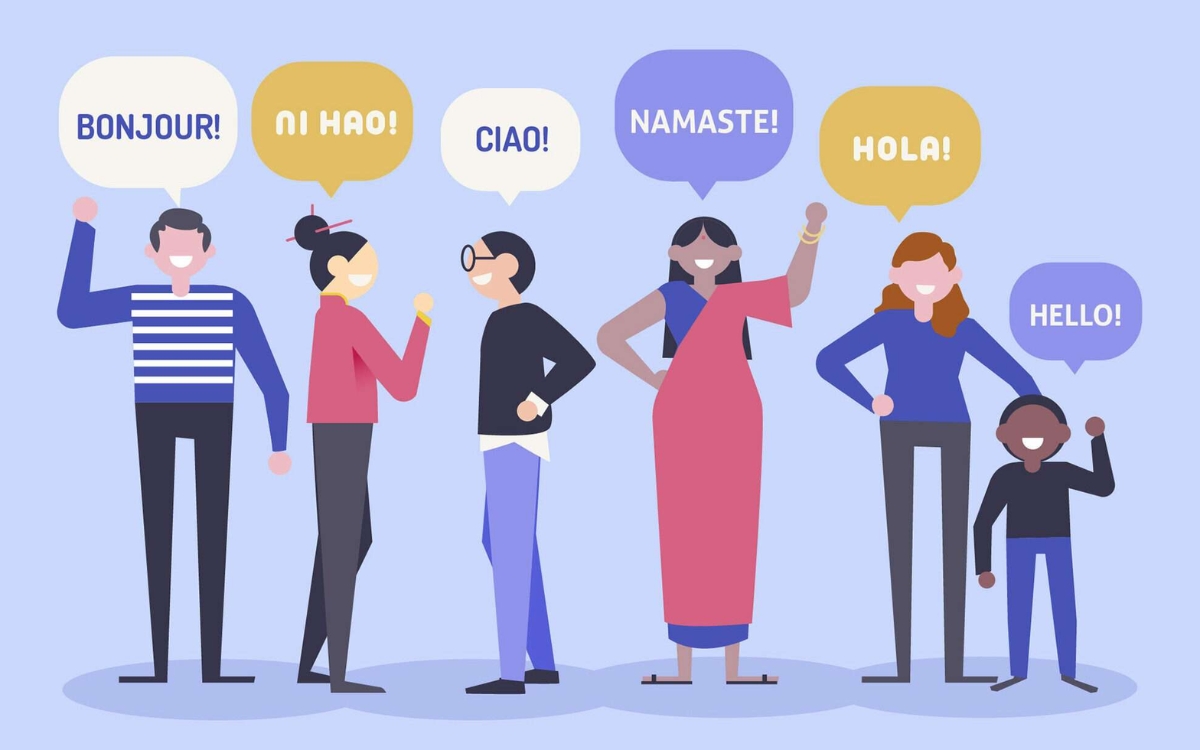
Vocabulary for Language topic
Vocabulary về các ngôn ngữ phổ biến trên thế giới
| Từ vựng | Ý nghĩa |
| Afrikaans | tiếng Afrikaans (tiếng chính thức ở Nam Phi) |
| Arabic | tiếng Ả-rập |
| Belarusian | tiếng Belarus |
| Bulgarian | tiếng Bulgaria |
| Cantonese | tiếng Quảng Đông |
| Chinese | tiếng Trung Quốc phổ thông |
| Danish | tiếng Đan Mạch |
| English | tiếng Anh |
| Finnish | tiếng Phần Lan |
| German | tiếng Đức |
| Japanese | tiếng Nhật |
| Russian | tiếng Nga |
| Vietnamese | tiếng Việt |
Vocabulary chỉ những người sử dụng ngôn ngữ
| Từ vựng | Ý nghĩa | Ví dụ |
| bilingual | song ngữ, người nói hai ngôn ngữ | Growing up in a bilingual household, she is fluent in both French and German. |
| multilingual | đa ngôn ngữ, người biết nhiều ngôn ngữ | The conference attracted a multilingual audience, with participants from over 20 different countries. |
| polyglot | người biết nhiều ngôn ngữ | As a polyglot, he easily converses in five different languages during his travels. |
| linguist | nhà ngôn ngữ học | The linguist conducted extensive research on the dialects spoken in rural areas. |
| interpreter | người phiên dịch, thông dịch viên | The meeting was smooth thanks to the skilled interpreter who translated every conversation accurately. |
Vocabulary miêu tả khả năng sử dụng ngôn ngữ
| Từ vựng | Ý nghĩa | Ví dụ |
| proficient | thành thạo, giỏi | He became proficient in coding after taking several advanced programming courses. |
| fluent | lưu loát | She is fluent in Italian, allowing her to easily communicate with her relatives in Rome. |
| articulate | (lời nói) rõ ràng, rành mạch | The teacher praised the student for his articulate presentation on climate change. |
| competent | có khả năng, đủ tài năng | She is competent in graphic design, handling projects with creativity and skill. |
Vocabulary miêu tả lợi ích của việc biết nhiều ngôn ngữ
| Từ vựng | Ý nghĩa | Ví dụ |
| cultural awareness | nhận thức văn hóa | Traveling abroad greatly enhances your cultural awareness and understanding. |
| communication | giao tiếp | Effective communication is key to the success of any team project. |
| career prospects | triển vọng nghề nghiệp | Completing an MBA program can significantly boost your career prospects. |
| cognitive benefits | lợi ích về nhận thức | Playing chess regularly can provide cognitive benefits, improving problem-solving skills and memory. |
| to contribute to cultural diversity | góp phần vào sự đa dạng văn hóa | Hosting international students can contribute to cultural diversity on campus. |
Vocabulary chung liên quan đến chủ đề Language (Ngôn ngữ)
| Từ vựng | Ý nghĩa | Ví dụ |
| lingua franca | ngôn ngữ cầu nối | In international business meetings, English often serves as the lingua franca for participants from different countries. |
| mother tongue | tiếng mẹ đẻ | Despite living abroad for years, she still speaks her mother tongue at home with her family. |
| minority language | ngôn ngữ thiểu số, được ít người nói | Efforts are being made to preserve and promote the use of the region’s minority language. |
| foreign language | ngoại ngữ | She enrolled in an evening course to improve her skills in a foreign language. |
| local dialect | tiếng địa phương, phương ngữ | Understanding the local dialect can provide deeper insights into the culture of the area. |
| linguistic diversity | sự đa dạng ngôn ngữ | Linguistic diversity in the city reflects its rich multicultural heritage. |
Một số cách diễn đạt thường dùng trong chủ đề What language do you speak
Việc sử dụng các cách diễn đạt linh hoạt và tự nhiên sẽ giúp bạn ghi điểm cao khi nói về chủ đề What language do you speak IELTS Speaking. Do đó, Mc IELTS đã tổng hợp những cách diễn đạt thường dùng, nhằm giúp bạn trình bày ý tưởng một cách mạch lạc và thuyết phục. Hãy cùng khám phá và luyện tập để nâng cao kỹ năng nói của mình, đồng thời tự tin chinh phục kỳ thi IELTS!

Một số cách diễn đạt thường dùng trong Speaking IELTS topic Language
Cụm từ diễn đạt ghi điểm trong chủ đề What languages can you speak
| Phrase | Ý nghĩa |
| barrier to communication | rào cản giao tiếp |
| diplomatic crisis | khủng hoảng ngoại giao |
| face-to-face communication | giao tiếp trực tiếp |
| provides you easy access to | giúp bạn dễ dàng tiếp cận |
| sense of appreciation | sự đánh giá cao, sự biết ơn |
| at a conversational level | ở mức có thể giao tiếp được |
| the world’s linguistic heritage | di sản ngôn ngữ thế giới |
| to master a language | làm chủ/ giỏi một ngôn ngữ |
| to have a high level of proficiency in… | thành thạo ngôn ngữ nào đó |
| facilitate cross-cultural/ international communication | nâng cao sự hội nhập, tăng sự giao lưu quốc tế |
| to sharpen one’s fluency | tăng cường sự trôi chảy (trong một ngôn ngữ) |
| enhance expressive capacities/convey your meaning | nâng cao khả năng diễn đạt |
| language education policy | chính sách giáo dục ngôn ngữ |
| to support language learning | hỗ trợ việc học ngôn ngữ |
Những Idiom thông dụng trong chủ đề IELTS speaking language
| Idiom | Ý nghĩa |
| at a loss for words | cạn lời, chẳng biết phải nói gì vì bất ngờ |
| talk a mile a minute | nói rất nhanh |
| watch your language | watch your language |
| it’s all greek to me | dùng để nói một ngôn ngữ mà bạn hoàn toàn không hiểu |
| beat around the bush | nói vòng vo tam quốc |
| mince one’s words | nói thẳng ra một cách rõ ràng, thậm chí có thể khiến người khác buồn lòng (nói toạc móng heo) |
Tự tin ghi điểm chủ đề What language do you speak (Language) cùng Mc IELTS
Bạn có biết rằng việc nắm vững cách diễn đạt trong Speaking IELTS Topic Language có thể giúp bạn gây ấn tượng mạnh mẽ với giám khảo? Để đạt được điều đó, hãy đồng hành cùng Mc IELTS vì đây là Trung tâm Anh ngữ uy tín hàng đầu có các cựu giám khảo chấm thi IELTS giàu kinh nghiệm, những quyền lợi và phương pháp học tập tối ưu.
Quyền lợi đặc biệt khi đăng ký học tại Mc IELTS:
- FREE 6 buổi học 1-1 hàng tuần với cố vấn học tập: Giúp bạn giải đáp mọi thắc mắc và tăng cường luyện tập theo nhu cầu cá nhân.
- Học lại miễn phí nếu không đạt điểm lên lớp: Liên hệ ngay để được tư vấn chi tiết và không phải lo lắng về chi phí khi cần học lại.
- Tham gia nhóm trao đổi Online trên Facebook: Nhận những lời khuyên quý báu từ cựu giám khảo IELTS và kết nối với cộng đồng học viên năng động. Tham gia nhóm tại đây.
- Kho tài liệu IELTS Online phong phú: Truy cập hơn 50 đầu sách đa dạng và bổ ích giúp bạn tự học hiệu quả.
- Hỗ trợ học bù và bảo lưu trong quá trình học: Đảm bảo bạn không bỏ lỡ bất kỳ bài học quan trọng nào.
Mc IELTS tự hào với hơn 1000 đánh giá xuất sắc từ học viên:
- Đánh giá 4.9/5.0 trên Facebook, xem chi tiết tại đây.
- Đánh giá 4.9/5.0 trên Google, xem chi tiết tại đây.
- Đánh giá 9.2/10 trên Edu2review, xem chi tiết tại đây.

Đánh giá tích cực của đông đảo cựu học viên
Với những bài mẫu về topic What language do you speak và danh sách từ vựng phong phú được cung cấp trong bài viết này, hy vọng bạn đã sẵn sàng để tự tin đối mặt với giám khảo và ghi điểm cao. Hãy luyện tập chăm chỉ và áp dụng những kỹ thuật đã học để hoàn thiện kỹ năng Speaking của mình. Để tối ưu hóa kết quả hơn và đảm bảo bạn được trang bị đầy đủ kiến thức và kỹ năng cần thiết, hãy tham gia các khóa học tại Mc IELTS. Với đội ngũ giảng viên là những cựu giáo viên chấm thi giàu kinh nghiệm và phương pháp giảng dạy tiên tiến, Mc IELTS sẽ giúp bạn chinh phục kỳ thi IELTS một cách xuất sắc. ĐĂNG KÝ NGAY hôm nay để nhận được sự hỗ trợ tốt nhất!
Nhận lộ trình IELTS TỐI ƯU theo yêu cầu





